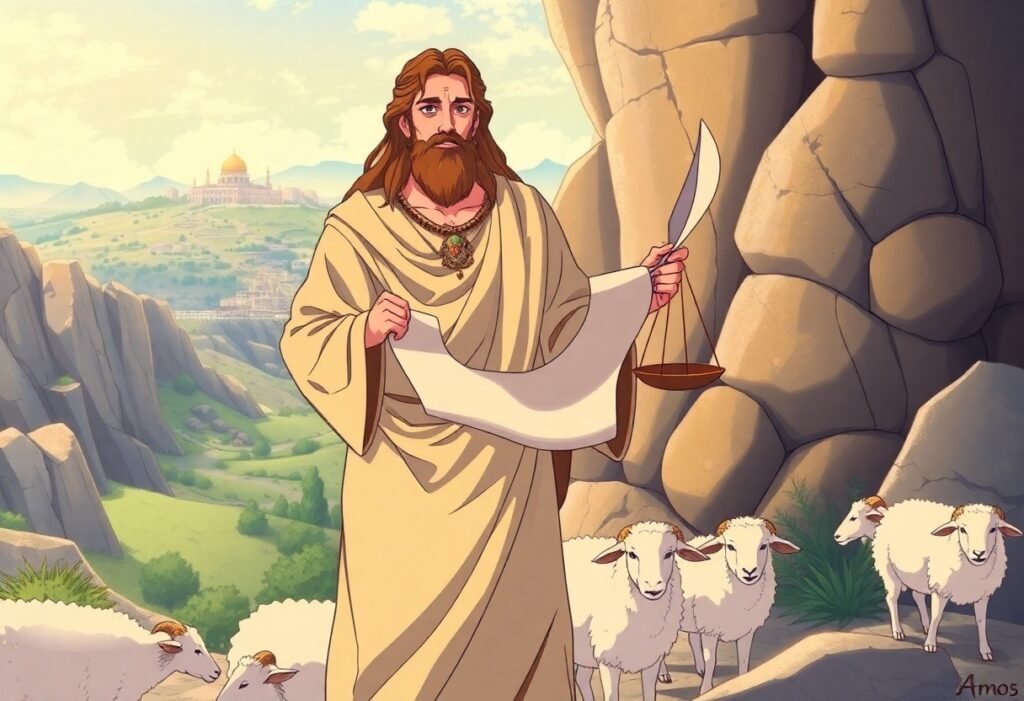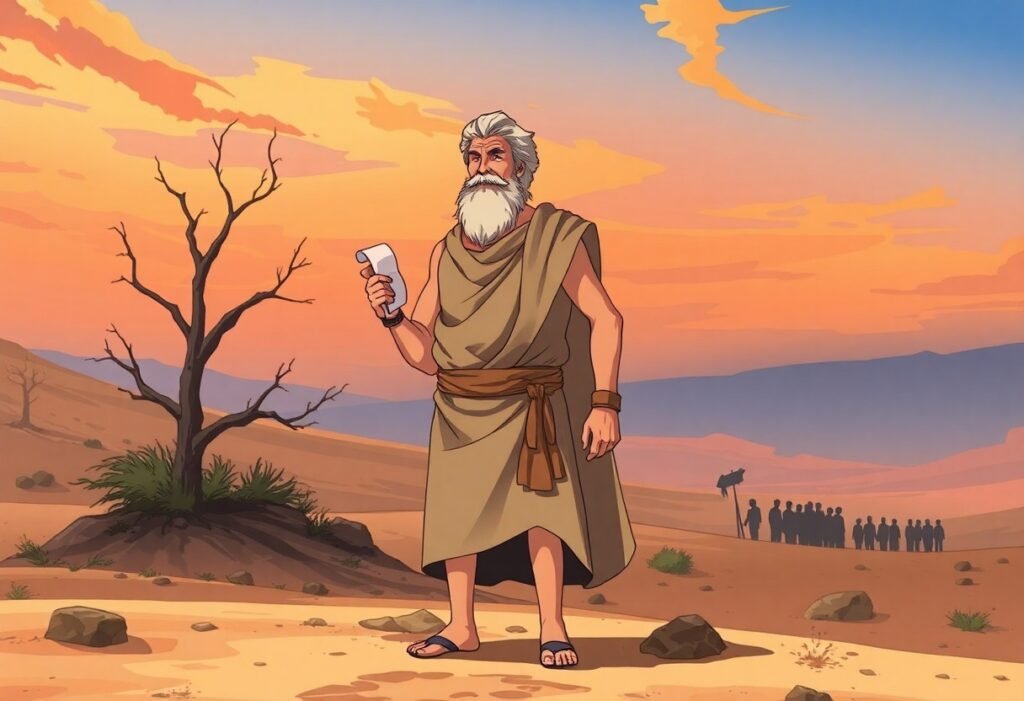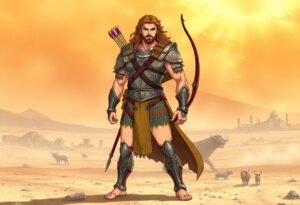Amos, a humble shepherd and fig tree farmer from Tekoa, was called by God to deliver a powerful message of judgment to the northern kingdom of Israel. His story, found in the Book of Amos, highlights themes of social justice, divine judgment, and the need for repentance. Known as the “Prophet of Justice,” Amos was not a professional prophet but an ordinary man whom God chose to speak out against the injustices and spiritual complacency of his time. His message still resonates today as a call to seek righteousness and justice in our personal lives and society.
Biblical Story
Amos lived during the reign of King Jeroboam II of Israel, a time of great prosperity for the nation. However, while Israel enjoyed material wealth, it was also a period of significant moral and spiritual decline. The rich exploited the poor, the powerful oppressed the weak, and religious practices had become empty rituals. God called Amos to go from Judah to Israel and confront the people with their sins.
Amos’s message was direct and uncompromising. He began by pronouncing judgment on the surrounding nations for their injustices, but then turned his attention to Israel, warning them that God’s judgment was coming for their oppression of the poor, corruption, and hypocrisy:
“Thus saith the LORD; For three transgressions of Israel, and for four, I will not turn away the punishment thereof; because they sold the righteous for silver, and the poor for a pair of shoes; That pant after the dust of the earth on the head of the poor, and turn aside the way of the meek: and a man and his father will go in unto the same maid, to profane my holy name: And they lay themselves down upon clothes laid to pledge by every altar, and they drink the wine of the condemned in the house of their god.”
(Amos 2:6-8)
Amos specifically condemned the wealthy elites for their luxurious lifestyles, which were built on the suffering of others. He rebuked the people for their false sense of security, thinking that their religious rituals would protect them from God’s judgment, while they neglected the true heart of worship—justice and righteousness:
“I hate, I despise your feast days, and I will not smell in your solemn assemblies. Though ye offer me burnt offerings and your meat offerings, I will not accept them: neither will I regard the peace offerings of your fat beasts. Take thou away from me the noise of thy songs; for I will not hear the melody of thy viols. But let judgment run down as waters, and righteousness as a mighty stream.”
(Amos 5:21-24)
Despite the harshness of his message, Amos also called the people to repentance, urging them to “seek the Lord and live” (Amos 5:6). He warned that if they did not turn back to God, judgment would come in the form of military defeat, exile, and the destruction of their kingdom. Tragically, Israel ignored Amos’s warnings, and his prophecies were fulfilled when the Assyrians conquered the northern kingdom and took the Israelites into captivity.

Psalm 56:3
49.99$Character Traits
Amos is known for his courage, boldness, and integrity. As a simple farmer, he had no formal religious training or status, yet he fearlessly spoke out against the powerful and wealthy elites of Israel. His willingness to deliver an unpopular message shows his deep commitment to God’s truth, even in the face of opposition.
Amos was also deeply compassionate. His strong condemnation of injustice was rooted in a genuine concern for the poor and oppressed. His message wasn’t just about warning of judgment; it was a passionate plea for the people to return to justice and righteousness, to care for the vulnerable, and to honor God in their actions.
Despite the personal cost of his mission, Amos remained faithful to God’s calling, showing his dedication to delivering God’s message regardless of how it was received.

Spiritual Lessons
Amos’s story offers significant spiritual lessons, particularly around the themes of justice, righteousness, and true worship. One of the key messages of Amos is that God cares deeply about how we treat others. In Amos 5:24, God declares:
“But let judgment run down as waters, and righteousness as a mighty stream.”
(Amos 5:24)
Here he emphasizes that justice and righteousness are at the heart of true worship.
Another important lesson from Amos is that religious rituals and outward expressions of faith are meaningless if they are not accompanied by a life that reflects God’s justice and compassion. The Israelites were going through the motions of worship, but their hearts were far from God, as evidenced by their exploitation of the poor and their pursuit of wealth at the expense of others:
“I hate, I despise your feast days, and I will not smell in your solemn assemblies. Though ye offer me burnt offerings and your meat offerings, I will not accept them: neither will I regard the peace offerings of your fat beasts. Take thou away from me the noise of thy songs; for I will not hear the melody of thy viols.”
(Amos 5:21-23)
Amos also teaches us that God’s patience has limits. Though He is merciful and longs for His people to repent, there comes a time when persistent sin brings judgment. Amos’s warnings to Israel remind us that ignoring God’s call to repentance can have serious consequences.
Finally, Amos shows us that ordinary people can be used by God in extraordinary ways. Amos wasn’t a priest or a prophet by profession; he was a shepherd and a farmer. Yet, God called him to be His mouthpiece to a nation in need of correction. His story encourages us that no matter our background or profession, we can answer God’s call to stand for truth and justice.
Relationship with God
Amos’s relationship with God was one of deep faith and obedience. Despite being an ordinary man from the southern kingdom of Judah, Amos responded to God’s call to deliver a difficult message to the northern kingdom of Israel. His willingness to leave his familiar surroundings and confront a nation in moral decay reflects his trust in God’s guidance and his commitment to fulfilling God’s will.
Amos also displayed a keen sense of God’s holiness and justice. He understood that God is not indifferent to sin, especially when it involves the mistreatment of others. His relationship with God was marked by a profound understanding of God’s heart for the oppressed and a desire to see God’s righteousness enacted in society.
Though Amos’s mission was challenging, his faithfulness to God’s message shows the depth of his relationship with God, as he trusted in God’s justice, even when his warnings were not heeded.

Psalm 56:3
49.99$Impact on Biblical History
Amos’s impact on biblical history lies in his bold proclamation of God’s justice and his call for repentance. His message was not only relevant to the northern kingdom of Israel but also serves as a timeless reminder of God’s concern for justice and righteousness. Amos’s prophetic words laid the foundation for future prophets who would continue to emphasize social justice, including Isaiah, Jeremiah, and Micah.
Amos’s message of justice and righteousness has resonated throughout history, inspiring movements for social justice and reform. His call to “let justice roll on like a river” has been quoted by leaders such as Dr. Martin Luther King Jr. during the civil rights movement, showing the enduring relevance of his message.
In the New Testament, Amos’s prophecies are referenced by the apostles. In Acts 15:16-17, James quotes from the Book of Amos to show how God’s plan of salvation includes the Gentiles, highlighting the broad scope of Amos’s prophetic vision.
“After this I will return, and will build again the tabernacle of David, which is fallen down; and I will build again the ruins thereof, and I will set it up: That the residue of men might seek after the Lord, and all the Gentiles, upon whom my name is called, saith the Lord, who doeth all these things.”
(Acts 15:16-17)
Symbolism and Foreshadowing
Amos’s prophecies are rich with symbolism, particularly around themes of justice, judgment, and restoration. His vision of God measuring Israel with a plumb line (Amos 7:7-8) symbolizes how God was assessing the moral straightness of the nation. This image of the plumb line foreshadows the coming judgment, as the nation was found to be “out of line” with God’s standards.
“Thus he shewed me: and, behold, the LORD stood upon a wall made by a plumbline, with a plumbline in his hand. And the LORD said unto me, Amos, what seest thou? And I said, A plumbline. Then said the LORD, Behold, I will set a plumbline in the midst of my people Israel: I will not again pass by them any more:”
(Amos 7:7-8)
Amos’s warnings of destruction also foreshadow the eventual exile of Israel by the Assyrians. His call to repentance highlights the conditional nature of many of God’s warnings—judgment could be avoided if the people would turn back to God.
Amos also foreshadows the coming restoration and salvation through the Messiah. In the final chapter of his book, Amos speaks of the restoration of David’s fallen tent, a prophecy that points to the coming of the kingdom of God through Jesus Christ:
“In that day will I raise up the tabernacle of David that is fallen, and close up the breaches thereof; and I will raise up his ruins, and I will build it as in the days of old:”
(Amos 9:11)

Modern-Day Application
Amos’s message is as relevant today as it was in ancient Israel. His call for justice and righteousness challenges us to examine our own lives and societies. How do we treat the poor and marginalized? Are we living in ways that reflect God’s heart for justice, or are we more concerned with wealth, power, and personal gain?
Amos reminds us that true worship is not just about religious rituals but about living out our faith through justice, mercy, and compassion. In a world where inequality and injustice often thrive, Amos’s words call us to stand up for those who are oppressed and to seek justice in all areas of life.
Amos also teaches us the importance of responding to God’s call, no matter how challenging it may be. Like Amos, we may feel unqualified or out of place, but God can use ordinary people to do extraordinary things when we are willing to follow His lead.
Interesting Facts
- Amos was not from Israel but from the southern kingdom of Judah. Despite this, God sent him to prophesy to Israel.
- Amos was a shepherd and a tender of sycamore-fig trees, making him a unique prophet not associated with the religious establishment.
- The Book of Amos is one of the earliest prophetic books, likely written around 760–750 B.C., during a time of relative peace and prosperity for Israel.
Reflection Questions
- How does Amos’s message challenge you to seek justice and righteousness in your own life?
- What are some ways you can practice true worship by caring for the poor and oppressed?
- How can Amos’s courage and faithfulness to God’s call inspire you to speak out against injustice today?
Conclusion
Amos’s life and message are a powerful reminder of God’s heart for justice, righteousness, and true worship. As we reflect on his story, let us be reminded that God calls each of us to stand for truth, care for the oppressed, and live out our faith in ways that honor Him. Just as Amos was used to deliver a crucial message to a nation in moral decline, we too can be vessels for God’s justice and mercy in our world today. Let justice and righteousness flow like a never-ending stream in our lives, as we strive to honor God with both our words and actions.








